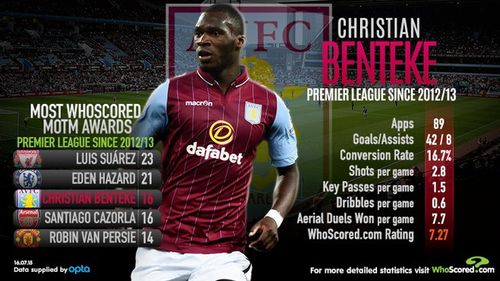
Statistical look at Christian Benteke - Is he worth the risk for Liverpool?

There has been a level of scepticism about the £32.5 million transfer of Christian Benteke to Liverpool that feels a touch surprising. The 24-year old is, on the face of it, just the profile of player Liverpool need to be signing: a striker who has scored goals consistently, who has the potential for further development and should be just moving into his peak years.
Benteke’s goals record has been impressive since he joined Racing Genk from Standard Liege in 2011. He got 16 goals in 22 starts (and 10 sub appearances) that season and had scored three in five when he moved to Aston Villa a year later.
Given how poor Villa have been recently – and how dourly they played under Paul Lambert – a record of 42 goals in 82 league starts is remarkable. What’s even more striking is that that includes a spell in which he scored just two league goals in a year as he was out and then recovering from a serious Achilles injury.
That poor run of form ended shortly after Tim Sherwood had replaced Lambert as manager when he scored the last-minute penalty winner against West Brom. He went on to score 11 more league goals in the nine games that followed.
He finished the season with 13 league goals, the ninth highest tally in the league – a figure that is all the more remarkable given that only two of those who scored more goals than him started fewer games and that Villa scored just 31 goals in total, fewer than any other side apart from Burnley.
It says much for the negativity of Villa’s approach (under Lambert) that they managed just 11 shots per game – 2.8 of them by Benteke. So in the team that had the third worst shots per game record, he managed the 12th-highest shots per game record. That gives some indication of his capacity for creating shooting opportunities for himself.

It might also, of course, suggest a certain selfishness: it may be that a player who has a high proportion of his team’s shots does so because he never looks for other options. That’s not the case with Benteke though: he also recorded 1.1 key passes per game. That’s only the 62nd highest figure recorded in the league last season, but it’s significant that only three of the players higher than him in that list – Eden Hazard, Alexis Sanchez and Diego Costa – scored more goals.
Benteke’s greatest strength, though, is in the air. He won a staggering 6.5 aerial duels per game last season – 1.7 more than any other player (Leonardo Ulloa was second). That’s in part down to how Villa played – often knocking the ball direct for him, but the fact that he won 55.6% of those duels (defenders tend to win a higher proportion) shows his strength in that area.
There is a downside to the physical power and presence, though, which is Benteke’s touch can at times be heavy. He was dispossessed 1.9 times per game last season – which is high for a player who completed only 0.6 dribbles, and his rate of 2.3 poor first touches per game was the joint sixth-worst in the division. In a target-man, though, that’s often the pay-off: he batters defenders and wins aerial balls, but there will be times when he squanders passes to feet.
And that, perhaps, is where there is reason for legitimate concern. How exactly is Brendan Rodgers intending to play this season? He arrived at Liverpool from Swansea City with a reputation of playing intricate passing football and sold off Andy Carroll at a significant loss because he didn’t believe he fitted those principles. With Daniel Sturridge and Luis Suarez, he adapted to a more direct style, trying to take advantage of their pace. Last season there was a return to something more possession-based.
This season, with Benteke, the suspicion may be that there will be more direct football, more long balls hit forward early. There’s nothing wrong with that in itself, and to an extent Rodgers’ hand has been forced by the market, but regular changes in style are rarely the sign of a stable or developing club.